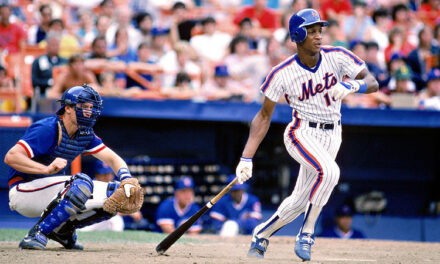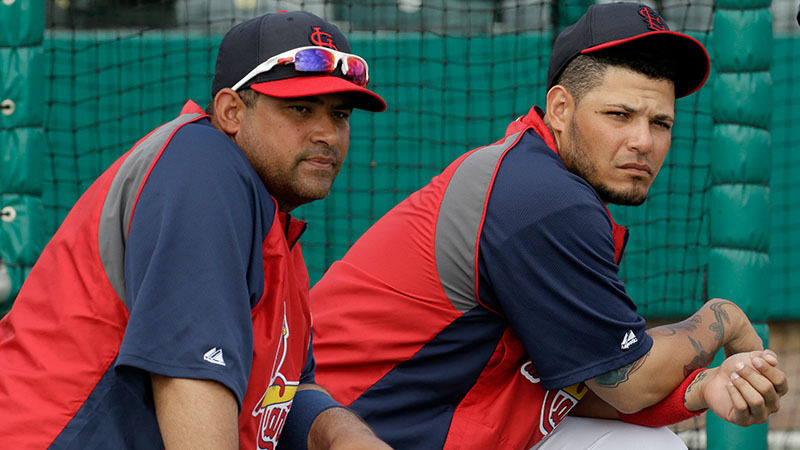
The odds of making the major leagues are slim, but don’t tell the Molina brothers that.
The Molina’s, consisting of Bengie (43), Jose (42) and Yadier (35) is considered one of baseball’s royal families. Not only did the trio of siblings make it to the majors, but all three played at least a dozen years in the majors, won at least two World Series and played the same position: catcher.
Growing up in Vega Alta, Puerto Rico, baseball was life to the Molinas. Baseball brought them great joy and fulfillment, and what made it even better for the brothers is the person who taught them the game, the person Bengie Molina calls the family’s real Hall of Famer: their father.
Benjamin Molina, Sr., the patriarch in the Molina household, worked tirelessly with all three of his sons to hone their skills on the field while ensuring that they were better men off it. Though the elder Molina worked tirelessly at a Westinghouse factory by day, by night, he sought to ensure that his three sons were respectful, humble and appreciative of family and all that they were given.
On the diamond, Molina Sr. was instrumental in each of his son’s development, catering to their individual strengths and weaknesses, while working hard to ensure that their grasp of the basic fundamentals of the sport was instilled first and foremost.
While most ardent fans of the sport know of the three Molina brothers, the story of the man who raised and developed the talent in the family had little to no mention in the mainstream media. The oldest of the three Molina brothers, Bengie, decided, along with his wife, Jamie, that a perfect way to give proper tribute to the man they most revered would be by writing a book as a tribute.
The book, Molina: The Story of the Father Who Raised an Unlikely Baseball Dynasty sheds light on his father’s story. A therapeutic, yet personal homage to a man that meant the world to his sons, Molina chronicles his relationship with his father and shares personal anecdotes of how he helped shape him into the man he became.
Beyond raising and teaching all three of his sons, Molina Sr. was a staple in Puerto Rico. He’s enshrined in the Puerto Rican Hall of Fame for his own baseball career, one that could’ve potentially amounted to a career in the majors.
Molina Sr. once had a tryout set up with a major league scout but never showed. The reason? His wife was expecting their first child, Bengie, and decided that he needed to put aside his baseball ambitions to be there for his wife and growing family.
The tale of the Molina brothers is one of perseverance, with their personal accomplishments and accolades a testament to their upbringing, which includes their loving mother, Gladys.
In the book, Molina details personal highs and lows, including the sudden and devastating revelation that his father had a massive heart attack prior to coaching a youth baseball game in 2008, and died at the age of 58.
The elder Molina never stopped coaching, even when his three sons were off living their dreams in the majors. His dedication to the children of Puerto Rico to help shape their young baseball careers adds to his legacy, one in which enriched the lives of thousands. Included among the throngs of kids he helped coach were future All-Stars and Hall of Famers, including Bernie Williams, Jose Hernandez and Ivan Rodriguez.
The commitment and investment Molina Sr. made in enriching children’s lives does not go unnoticed by Bengie, who speaks admirably about the time and zeal Molina Sr. gave to aiding others. While he was described as a man of few words, Molina noted that his father didn’t need to say a whole lot to be understood, that he could tell just by a look his father gave to him as to what he wanted him to do.
Leadership and being a field manager are key attributes for a catcher to have, and certainly qualities that Molina Sr. never stopped instilling to his three sons.
While the memoir offers a retrospect into the Molina household, it also reflects on Bengie’s professional career. In total, Molina spent thirteen seasons in the majors, playing for four teams and a member of two World Series champions (2002 with the Angels and earning another as a member of the San Francisco Giants in 2010, before a July trade to the Texas Rangers).
I had the privilege of speaking with Molina in mid-February, where we discussed his book and father, signing with the Angels in 1993 and how close he came to becoming a member of the Mets in 2006.
MMO: What initially made you want to write this book, Bengie?
Molina: When my dad passed away my wife came up with the idea of doing it as a tribute to him. Everybody knows that we are the Molina brothers in the majors and we get the glory or whatever they want to call it. But the real hero and the real Hall of Famer for us in our hearts is our dad and mom. That was one of the main reasons why we wanted to write this book, so people out there could know the real story of the Molina brothers instead of knowing the people that played.
I think that was one of the main reasons, as a tribute to him. Plus, he was such a great man with us. He’s in the Hall of Fame for his amateur playing days in Puerto Rico. He’s also in the Hall of Fame as a coach for Little League. That’s what I wanted people to know, that he’s in the Hall of Fame as a player and as a coach for helping kids, too.
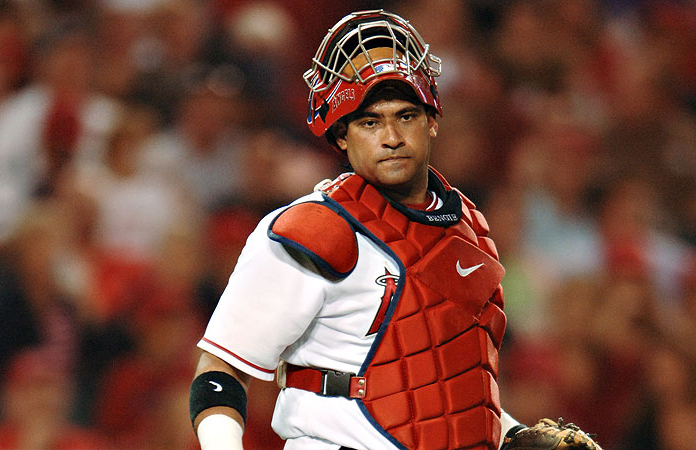
Photo Credit: John Cordes
MMO: For those who haven’t read your book, can you talk about the kind of man your father was?
Molina: My dad was a very humble guy, he never liked to brag. He used to go every weekend and hang out with his friends and play dominoes and have fun. He was very humble, very quiet.
He was a guy of very few words but then he would say a lot, you know what I’m saying? Just [by] looking at you.
MMO: Was he a tough coach on you and your brothers growing up?
Molina: He wasn’t tough, he was quite the opposite. When I started playing baseball, the reason he made the team was because me and a couple of his friends that worked with him – their sons – didn’t make the team. We were really bad players and that’s just the truth.
The reason he made the team was so that we could play and he told us right away, “I don’t want to win. I’m not looking to win, I’m looking to teach you the game of baseball. Just concentrate on learning and then we’ll concentrate on winning whenever we’re ready. If you’re not ready, don’t worry about it. Just come here, go to school, respect your elders, respect your parents and teachers. If we win later, we win later.”
Let me tell you, that’s what happened! I don’t know if he saw it or not, but he trained us for a while. We didn’t win a game for probably the first couple of years. The third year we won a few and we kept getting better and better.
He wasn’t worried about any winning, he was worried about making men out of us for the future and making us better players to have more opportunities.
MMO: An interesting part of your book was when you discuss attending Arizona Western College, with hopes of attracting more scouts to see you play. You had to take English classes and were a young man in an unfamiliar place. How difficult was that transition for you, especially being away from home?
Molina: It was very, very difficult. You wish you could speak a little bit so you can communicate with everybody on the field and become more friendly with the guys and build that chemistry. It was very difficult; I didn’t know how to order a burger! I didn’t know how to communicate.
I had a roommate that was Puerto Rican, same as me, and I went to the coach and I said, ‘Can I get an American roommate?’ He looked at me like, what, are you serious? I said, ‘If I want to be able to learn English fast, I better have one of those guys.’
And I did – I forgot his name – but he was very, very nice and he took me under his wing. He started by asking me, “How do you say bed? How do you say toilet?” Anything that was in the room at the moment I would tell him in Spanish and he was telling me in English. By the way, he learned Spanish, he knew Spanish by the end of his two years at junior college. He actually worked, too. It worked for him.
MMO: I didn’t know until reading your book that you didn’t catch at all until the Angels asked you to in their tryout in 1993. How difficult was it for you to find yourself in that situation, with a major league scout on hand and having to play a position that was foreign to you?
Molina: It was very difficult because of the position, but it wasn’t difficult because I saw it like a chance. I actually saw it as my last chance to be a pro baseball player. It was difficult just to adjust and to catch and throw. At the same time, I didn’t see it that way. I just thought this was my opportunity, the guy likes me as a catcher and I’m going to make the most out of it.
Thank God that worked.
MMO: Fast forward a few years after you’ve played a couple of seasons in the Angels minor league system. You name Sal Fasano as a mentor in 1996 while playing Winter Ball. How big of an influence was he in helping form your catching skills?
Molina: Well actually, as a catching instructor, I’ve got to give credit to Orlando Mercado, Bill Lachemann, Bob Clear and John McNamara. He was there with me when I arrived in the minor leagues in Mesa in ’93, and I had no idea how to catch. They took their time and we were out there at 5:30 or 6:00 in the morning every day trying to learn as quickly as I could.
And here I go to Puerto Rico to play Winter Ball. If I didn’t play Winter Ball, I wouldn’t have made it, straight up. Winter Ball was a huge part [of my success]. A lot of veteran pitchers helped me out. I didn’t play as much as I would’ve loved to, but I spent my time in the bullpen with a lot of veteran pitchers.
Sal gave his time. He got there early because he knew I was there early, catching four or five bullpens before the game started. I knew I wasn’t playing because they had veteran players like him, and he was the starter. I got there early so I could catch bullpens and learn quickly and develop my skills. He took it upon himself to sit down with me for long hours and he would watch me catch bullpens.
He would tell me, “Put this knee this way. Try to get comfortable here. Let the ball travel to you. Receive the ball, don’t snap at it.” Anything that’s related to catching he would tell me, not that I didn’t hear it, but he was reassuring that I did it.
Sal was a big, big part in my catching success and whenever I see him I always tell him.
MMO: Where does playing with your brother, Jose Molina, on the 2002 World Champion Angels rank in your career?
Molina: I think it’s the top. Actually winning the World Series, getting a ring, and not only are you getting a ring, but you’re getting it with your brother on the same team? Come on, man! You can’t top that. I don’t care who you are. There’s no way in the world if you’re a baseball player that you can top that!
MMO: Was it ever tough having your brother on the same team with you?
Molina: We were very close. We would’ve won another championship if they kept us together, I really, really felt that way. He helped me, we had lunch together almost every day. It was awesome having him as part of me and being there together.
It was never a competition. If he would’ve been the number one and I was number two I would’ve been happy for him, so it wasn’t any of that. It was more of, how do we help these pitchers succeed and help our team win? We actually did it, man.
It’s pretty crazy to win a championship with your brother on your side.
MMO: At the end of the 2005 season, there were reports that the Mets had offered you a 3-year, $18 million deal. You chronicle in the book your desire to come to New York. Can you talk about what happened in that process?
Molina: The lovely part of free agency is that you don’t know where you’re going to end up. In my head we had no teams, we had no communication with anybody. All of a sudden, my agent called me and said, “Omar Minaya wants you there for three years, $18 million.”
I said, ‘Wow! Could we get a little bit more money? Negotiate some money and I’m in. Tell him yes so we don’t lose that offer!’
I didn’t have anything, we didn’t have any offers. Well, at least I didn’t know, I’m going to tell you later what happened. At that moment, I didn’t know we had other offers, but he (his agent) didn’t say that to me because he was looking for four-year deals. So everybody that had two-year deals in their head he was saying no to instead of consulting it with me.
The three-year deal with the Mets happened with me, Minaya and Tony Bernazard. He [Bernazard] was huge with me, he was Puerto Rican so he loved me. And I’m like, ‘Okay, three-year deal for $18 million. Let’s try to hustle a couple of more million in there for the taxes.’ That’s just a joke. I told him, ‘Hey, just hustle a couple more million for the taxes and tell him yes, I don’t want to lose it.’
And he said, “Yes, all right. I’m going to call them right now.”
I didn’t hear from him for the next week. It was kind of weird because I already said yes, and everybody’s asking me, “Did you sign?” And I said, ‘Yeah, I got a three-year deal with the Mets. I’m going to the Big Apple and going to try and hit that apple over there.’
I was having fun with it and I almost went to a hat store to buy the Mets hat. All of a sudden, I didn’t hear from my agent, and it’s kind of weird. I kept calling, no answer. I kept calling, no answer. I’m like, ‘Wow, that’s pretty weird.’
Then all of a sudden on the news they said that they got Paul Lo Duca in a trade. Here I am and I’m like, How the heck did they get Paul Lo Duca if they offered me a three-year deal? What happened?
I ended up calling the assistant of my agent and I said, ‘Where the hell is Alan? I’ve been trying to call him about the contract.’
He said, “I’m going to tell him. He’s going to call you right back.”
He ended up calling me and I said, ‘Alan, what the hell happened? I told you I said yes, and now they’ve got Lo Duca.’
His first reaction was, “Oh, you didn’t want to go there. You didn’t want to go to New York and play anyway.”
I’m like, ‘What the heck are you saying?’ He said that they didn’t want to go four years. I’m like, ‘What the hell!’ I didn’t say that, I said worse. [Laughs.]
Right away I fired the guy, I just said, ‘You’re fired, Alan. I don’t want any part with you. I don’t want any part with your organization or anything with you.’
And that’s how it happened. I was ready to go and be a Met. But all of a sudden, Alan Nero didn’t want it, I don’t know. And for some reason, it didn’t happen.
MMO: It’s crazy that you had no communication with your agent for that long of a period during a time when you had an offer on the table.
Molina: Yeah, that’s exactly what happened, man. I don’t have anything to hide. I was ready to go and then all of a sudden he said, “I didn’t want to go there, anyway.”
I’m like, ‘I don’t want to go where anyway? You’ve got to ask me, you’re not the one playing. I’m the one playing.’ Then we got into a big argument.
He went and visited me in Toronto because I ended up signing a one-year deal with Toronto with an option. I signed with like one week to go in spring. He came up to me and said, “I’m sorry about that deal with the Mets.”
And I said, ‘Hey, Alan, I told you before, I don’t want anything [to do] with you, man. I really don’t.’
He said, “Oh, but we’ve been with you for years.”
I told him, ‘I don’t care. You should’ve asked me, you should’ve asked me first. And then I’m the one who says no I don’t want to go there, or, I want to go there.’ So that’s what happened.
MMO: I certainly think you would’ve excelled in New York, Bengie. Especially with your passion, dedication and work ethic. I think the fans would’ve gravitated to you.
Molina: I would’ve loved it. I talked to Carlos Beltran, who took a lot of heat over there from a lot of fans. He told me, “B-Mo, they’re strong fans, but you would’ve loved it. You would’ve loved it.”
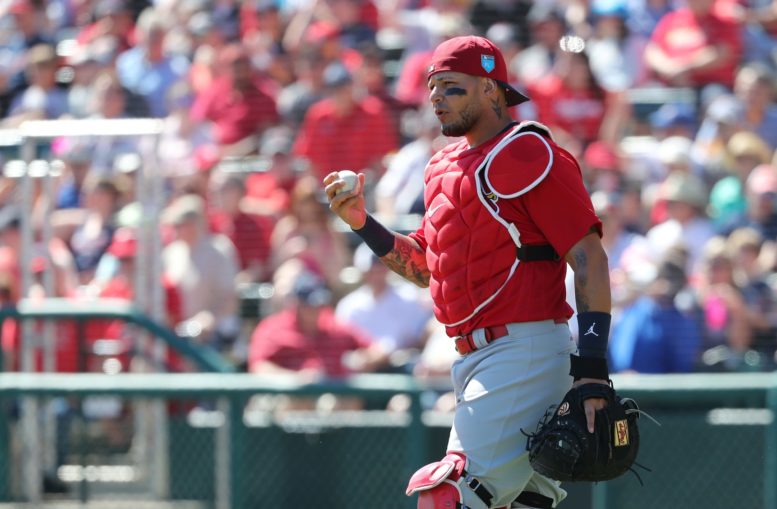
MMO: Talk a little about your youngest brother Yadier. You write in your book that it was clear very early on growing up that Yadier was the best player in your family. What makes him tick?
Molina: First of all, I think he took from both of us, from Jose and myself. He took whatever he could and learned it. If I have 100 percent of my mind in baseball, Yadi has 200 percent in baseball. He’s very dedicated to it. He’s dedicated to today, which if today he faces the Cubs, he wants to beat the Cubs. He doesn’t care about any other team.
Yadier’s mind is way ahead of other people, way ahead. By that, I mean in a smart way. Maybe not so much in regards to other guys’ production, but for me, he’s so smart, way over the top. And it makes him really special.
He cares, that’s one thing people need to know. He cares about his pitchers and about his team. He cares about that jersey he wears. He wants to play every day because he cares.
MMO: He certainly brings a fiery passion to the game, and holds his ground well.
Molina: He’s defending his territory, man. You’re not going to come here and punk me [speaking about the Reds/Cardinals brawl]. It’s just very true. If they would have done it to me we would’ve had the same type of reaction. You’re not going to come here and talk crap about my team the night before and come here and say hi to me. I would’ve done the same thing and probably a lot of players would’ve done the same thing.
MMO: One of the things your father told you that you could accomplish was hitting 20 home runs in a season. You came close in both 2006 and 2007 (19 home runs each). You finally accomplished the feat in 2009. Can you talk about how important that goal was for you personally?
Molina: He put it right in my head. I thought I was a 15-18-homer guy and a lot of RBIs, because thank God I was a clutch guy. But that’s what I thought I was. He said, “You could hit 20 home runs whenever you want to. You know that, right?”
I was like, ‘What?’
He put so many different thoughts into my head, and I was like, ‘Really, you think so? Do you know where I play? I play in San Francisco, buddy.’ But he said it, and he ended up passing away in 2008.
In 2009, I hit number twenty. It was a two-home run game. It was like my Hall of Fame speech. You know how kids think of speeches for the Hall of Fame? And you know how great they feel and awesome they feel? For me, that was it. For me, that was my Hall of Fame time that I could show my dad that hey, you were right, I hit twenty home runs in the big leagues. I never had 100 RBIs, although I came close. I never hit .300 but I came close, too.
Those are the numbers I wanted to [reach], and it was because of what you said in the beginning. You asked me about never catching before and all of a sudden you made it as an opportunity, you made it. A guy like me that’s not supposed to be there ends up doing these things, it’s a win/win.
That’s why it was very special to me.
MMO: In your thirteen-year major league career, who were the best pitchers you had the privilege of catching?
Molina: There were many, but the main ones that come to mind are Tim Lincecum, Roy Halladay, Cliff Lee and A.J. Burnett at his time. I caught Kevin Appier but he was older, he was in his last couple of years. I would’ve loved to have caught him when he was in his prime.
Oh man, I caught many good pitchers, but those are probably the main ones that stand out in my head.
MMO: What was the normal day-to-day preparation for you as a catcher when you were preparing for a series? Was it a lot of scouting reports and video?
Molina: Yeah, yeah, but that’s normal. You have to do that just because it’s your job, you have to do it. If you want to become a really smart catcher you have to do double time. If you watch one hour I’ll be watching two. That’s what I was doing. I was watching the video and reading the scouting reports. At this time, they had a lot of paperwork that tells you what they hit in 2-2 counts, what they hit with two outs, and all of that.
I was trying to pick the best out of them. If I was facing Matt Kemp, what did he hit? Or Andre Ethier, what do they like to hit in certain situations? I went with what they couldn’t hit because if I get beat with that at least we know they could hit that. It takes a lot of mental toughness and mental preparation to be a really good catcher.
It’s not impossible to do it, it just takes more time.
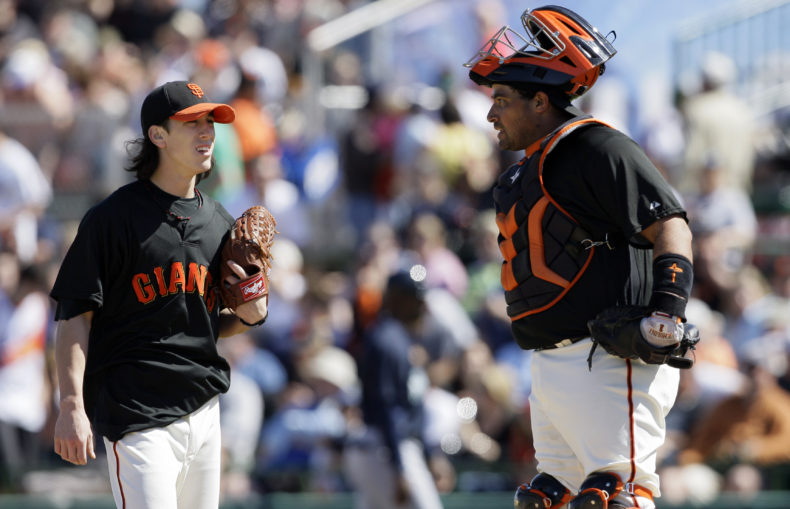
MMO: In today’s analytic world of baseball, catching stats has gotten more attention with metrics like pitch framing, pop time, etc. What are your thoughts on the new analytics in the game, and are you a proponent of utilizing them?
Molina: I’m an old-school guy, man. I’m a guy that loved the old school, talking to a pitcher and talking to hitters. I loved that more than a couple of numbers. I’m not against analytics, don’t get me wrong. I’m not saying I’m against it, I’m just an old-school guy. I can work with it and it could probably help me out but the numbers and analytics come after it happens, right?
You can tell me Jay Bruce is 2-for-3 against Adam Wainwright, but you’re telling me something that already happened. You’re not telling me something that’s going to happen next. Does he have a better chance of hitting him? Yes, because he’s 2-for-3. It doesn’t mean he has his number or anything like that. If Wainwright makes his pitches he’s going to get him out.
I’m not against it, I’m willing to work with it. I’m sure it’s going to make whoever uses it better because if you mix old school with analytics in your brain you’ll be fine.
If you give me the option, I’ll go old school. I’ll go watching the player, watching his heart. Nobody has come up to me yet and said, “What number heart or what number of guts or what number of feeling or toughness does a guy have?” You can’t measure that.
I’d rather see the guys that are five-foot-eleven but have just as big of a heart as a guy that’s six-foot-six. But the six-foot-six guy doesn’t know how to play, but you’re going to get the six-foot-six guy because he has the potential of doing it. But I’ll go with the five-foot-eleven [guy] because he’s a baller. He’s a guy that’s done it and who’s played before and has the passion. I’m just giving you an example of what I think.
MMO: I heard that your book has the potential to turn into a feature film. Is that true?
Molina: We haven’t come to an agreement, but we have a couple of companies that are very interested in making the book into a movie, so we’re in the works. We might make a documentary, we want that. It’s not there yet, there’s a lot of talking about it.
MMO: Can you talk a little about the weekly podcast you’re a part of, “Two Birds on a Bat,” and how you initially got involved with that?
Molina: Just the same as Twitter, as you did, and a lot of people have reached out to me for interviews and stuff. Jim Cromer – who’s the main guy there – and Steve Flowers, they asked me to do an interview, because Yadi plays for the Cardinals.
The podcast is actually supposed to be a Cardinals podcast, but we talk about baseball overall, life things; it’s not only the Cardinals. He asked me to do an interview and I said, ‘All right, no problem.’ I liked it and he said, “Do you mind being here for next week? The fans love it, you get fired up sometimes and the fans love it.” I told them I can do that.
That’s how it started, little by little. Before you know, it I told them, ‘Hey, I’d love to do this every week.’
MMO: It’s certainly a great way for you to stay involved with the game.
Molina: Yeah, and I actually have a job. I work for the Cardinals and do the Spanish radio, I’ve been doing it the last two years. The first year I did 10 games, the second year we did 23 or so. This year we’re going to do 39 or 40 games overall.
It’s the first time that the St. Louis Cardinals have ever done Spanish radio. I’m part of it with Polo Ascencio. As soon as the season starts and every weekend that they’re home we’ve got those games. I can’t wait for that.
MMO: You also get to keep an eye on Yadi and make sure he’s staying out of trouble!
Molina: [Laughs.] Exactly! I’m doing my own brother’s game. How great is that?!
MMO: Listen, your brother is one of the best catchers I’ve ever seen, but he killed my Mets in the ’06 NLCS and that home run in Game 7…
Molina: Hey, don’t get mad at Yadi, get mad at that pitcher. [Laughs.]
MMO: You’ve been a coach for both the Texas Rangers and St. Louis Cardinals after you retired as a player. Have you ever thought about managing someday?
Molina: I would love to be a manager in the major leagues. I’m telling you straight up, I would love to be a part of a team and I can not wait to see what I could do with 25 men on a roster. When we are in-between the white lines I can’t wait to see what I could do with a group and see if we can win a championship. I really, really want to be a manager!
It hasn’t happened yet, doesn’t mean it won’t. But we’ll see what happens. We’ll see who’s out there willing to give me an opportunity, that’s all it takes, somebody that’s willing to give you a chance.
MMO: I can’t thank you enough for your time today, Bengie. Thanks for sharing some great memories.
Molina: Thank you for having me. It was awesome.
Follow Bengie Molina on Twitter, @BengieMolina1
Check out Bengie Molina’s book, “Molina: The Story of the Father Who Raised an Unlikely Baseball Dynasty” by Bengie Molina and Joan Ryan.





